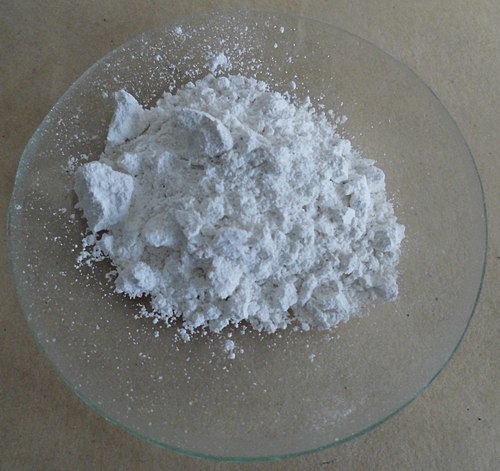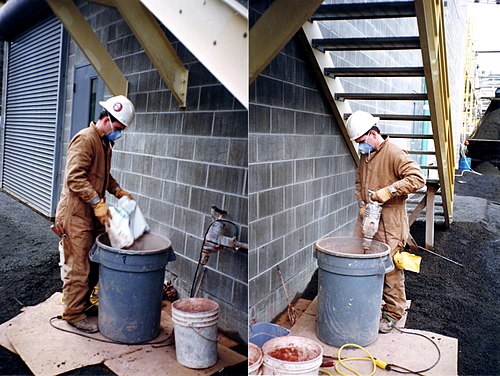Concreteadjective
Real, actual, tangible.
Concreteadjective
Being or applying to actual things, not abstract qualities or categories.
Concreteadjective
Particular, specific, rather than general.
Concreteadjective
United by coalescence of separate particles, or liquid, into one mass or solid.
Concreteadjective
Made of concrete, a building material.
Concretenoun
(obsolete) A solid mass formed by the coalescence of separate particles; a compound substance, a concretion.
Concretenoun
Specifically, a building material created by mixing cement, water, and aggregate such as gravel and sand.
Concretenoun
(logic) A term designating both a quality and the subject in which it exists; a concrete term.
Concretenoun
Sugar boiled down from cane juice to a solid mass.
Concretenoun
(US) A dessert of frozen custard with various toppings.
Concreteverb
To cover with or encase in concrete (building material).
Concreteverb
To solidify: to change from being abstract to being concrete (actual, real).
Concreteverb
To unite or coalesce into a mass or a solid body.
Concreteadjective
United in growth; hence, formed by coalition of separate particles into one mass; united in a solid form.
Concreteadjective
Standing for an object as it exists in nature, invested with all its qualities, as distinguished from standing for an attribute of an object; - opposed to abstract.
Concretenoun
A compound or mass formed by concretion, spontaneous union, or coalescence of separate particles of matter in one body.
Concretenoun
A mixture of gravel, pebbles, or broken stone with cement or with tar, etc., used for sidewalks, roadways, foundations, etc., and esp. for submarine structures.
Concretenoun
A term designating both a quality and the subject in which it exists; a concrete term.
Concretenoun
Sugar boiled down from cane juice to a solid mass.
Concreteverb
To unite or coalesce, as separate particles, into a mass or solid body.
Concreteverb
To form into a mass, as by the cohesion or coalescence of separate particles.
Concreteverb
To cover with, or form of, concrete, as a pavement.
Concretenoun
a strong hard building material composed of sand and gravel and cement and water
Concreteverb
cover with cement;
Concreteverb
form into a solid mass; coalesce
Concreteadjective
capable of being perceived by the senses; not abstract or imaginary;
Concreteadjective
formed by the coalescence of particles
Concreteadjective
existing in a material or physical form; not abstract
Concreteadjective
specific; definite
Concreteadjective
(of a noun) denoting a material object as opposed to an abstract quality, state, or action.
Concretenoun
a building material made from a mixture of broken stone or gravel, sand, cement, and water, which can be spread or poured into moulds and forms a mass resembling stone on hardening
Concreteverb
cover (an area) with concrete
Concreteverb
fix in position with concrete
Concreteverb
form (something) into a mass; solidify
Concreteverb
make real or concrete instead of abstract
Concrete
Concrete is a composite material composed of fine and coarse aggregate bonded together with a fluid cement (cement paste) that hardens (cures) over time. In the past, lime based cement binders, such as lime putty, were often used but sometimes with other hydraulic cements, such as a calcium aluminate cement or with Portland cement to form Portland cement concrete (named for its visual resemblance to Portland stone).
Cementnoun
A powdered substance produced by firing (calcining) calcium carbonate (limestone) and clay that develops strong cohesive properties when mixed with water. The main ingredient of concrete.
Cementnoun
(uncountable) The paste-like substance resulting from mixing such a powder with water, or the rock-like substance (concrete) that forms when it dries.
Cementnoun
(uncountable) Any material with strong adhesive and cohesive properties such as binding agents, glues, grout.
Cementnoun
(figurative) A bond of union; that which unites firmly, as persons in friendship or in society.
Cementnoun
(anatomy) The layer of bone investing the root and neck of a tooth; cementum.
Cementverb
(transitive) To affix with cement.
Cementverb
(transitive) To overlay or coat with cement.
Cementverb
To unite firmly or closely.
Cementverb
(figuratively) To make permanent.
Cementnoun
Any substance used for making bodies adhere to each other, as mortar, glue, etc.
Cementnoun
A kind of calcined limestone, or a calcined mixture of clay and lime, for making mortar which will harden under water.
Cementnoun
The powder used in cementation. See Cementation, n., 2.
Cementnoun
Bond of union; that which unites firmly, as persons in friendship, or men in society.
Cementnoun
The layer of bone investing the root and neck of a tooth; - called also cementum.
Cementverb
To unite or cause to adhere by means of a cement.
Cementverb
To unite firmly or closely.
Cementverb
To overlay or coat with cement; as, to cement a cellar bottom.
Cementverb
To become cemented or firmly united; to cohere.
Cementnoun
concrete pavement is sometimes referred to as cement;
Cementnoun
a building material that is a powder made of a mixture of calcined limestone and clay; used with water and sand or gravel to make concrete and mortar
Cementnoun
something that hardens to act as adhesive material
Cementnoun
any of various materials used by dentists to fill cavities in teeth
Cementnoun
a specialized bony substance covering the root of a tooth
Cementverb
make fast as if with cement;
Cementverb
cover or coat with cement
Cementverb
bind or join with or as if with cement
Cement
A cement is a binder, a substance used for construction that sets, hardens, and adheres to other materials to bind them together. Cement is seldom used on its own, but rather to bind sand and gravel (aggregate) together.


































